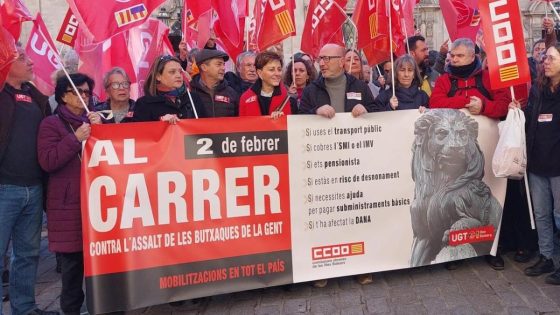On February 2, 2025, a significant event unfolded in Palma, Spain, as unions CCOO and UGT gathered over a hundred people in a rally at Plaza de Cort. This demonstration aimed to advocate for “social rights” amid ongoing state-level mobilizations. Why are these rights so crucial for workers and pensioners today?
- CCOO and UGT organized a protest in Palma.
- Protest aimed at defending social rights.
- Political maneuvering undermines workers' rights.
- New decree deemed insufficient for community needs.
- High living costs impact local workers' salaries.
- Call for prioritizing people's interests over politics.
Unions Rally in Palma to Demand Workers’ Rights and Social Justice
The recent rally in Palma raises important questions about the future of workers’ rights in Spain. With political parties playing games with essential social measures, how can we ensure that the needs of workers and pensioners are prioritized? The unions are making it clear that they will not back down.
Political Maneuvering Threatens Social Rights of Workers in Spain
The unions’ decision to protest stems from recent political actions that have left many vulnerable. Despite some agreements between parties, the situation remains precarious. Here are key points from the rally:
- Protests were sparked by the rejection of the Omnibus Decree, affecting pensions and public transport subsidies.
- Union leaders criticized the political tactics that undermine democracy and workers’ rights.
- Concerns were raised about the high cost of living and stagnant wages in the Balearic Islands.
- The unions demand that political interests do not overshadow the needs of the people.
Impact of Political Decisions on Workers’ Rights in Spain
The recent political decisions have significant implications for workers’ rights in Spain. With the rejection of crucial social measures, many fear that the rights of workers and vulnerable populations are at risk. The unions argue that political games should not dictate the well-being of citizens. Instead, they advocate for policies that prioritize social justice and equitable distribution of resources.
How the U.S. Can Learn from Spain’s Labor Movement
The challenges faced by Spanish workers resonate with issues in the U.S., where political divisions often hinder progress on labor rights. Both countries must recognize the importance of prioritizing social needs over political agendas. By learning from Spain’s labor movement, U.S. workers can advocate for their rights more effectively and push for policies that benefit all citizens.
In conclusion, the rally in Palma highlights a critical moment for workers’ rights in Spain. As unions continue to fight for social justice, the message is clear: the rights of the working class cannot be compromised for political gain.

































